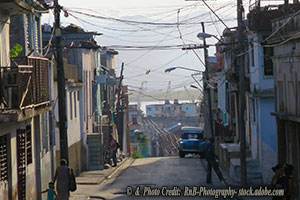
Electricity is at the forefront of essential services for a functioning modern society. However, in Cuba, after decades of central economic planning under communist leadership, reliable electricity remains an elusive luxury. The Marxist nation can spread revolutionary ideas worldwide but struggles to keep the lights on.
On March 14, 2025, the entire nation went dark after Cuba’s national power grid collapsed, leaving over 10 million people in the dark—again.
 Order Today: Return to Order: From a Frenzied Economy to an Organic Christian Society—Where We’ve Been, How We Got Here, and Where We Need to Go
Order Today: Return to Order: From a Frenzied Economy to an Organic Christian Society—Where We’ve Been, How We Got Here, and Where We Need to Go
This isn’t the first time the lights have gone out. Rolling blackouts lasting up to 20 hours a day have become common outside Havana for months. Recently, the entire system has been failing without warning. The empty promises of leaders like Cuba’s President Miguel Díaz-Canel have done little to enhance the struggling economic system that leaves ordinary citizens in the lurch, literally sitting in the dark.
The Tragedy of Central Planning
The communist economic system relies on central planning and the suppression of private property. The theory asserts that the central government can allocate resources more efficiently than free-market mechanisms. While the system promises prosperity, equality, and progress, it has only delivered inefficiency, mismanagement, corruption, theft and inflexibility.
For some 60 years, Cuba’s energy industry has functioned as a state-controlled monopoly. Unlike free-market systems, where competition fosters efficiency and innovation, Cuba’s communist model eliminates all incentives to innovate or sustain infrastructure.
Decades-old power plants and transmission lines now form the backbone of the island’s electrical grid, which is fragile, poorly maintained and overdue for replacement.
Cuba attributes its failures to the U.S. trade embargo rather than acknowledging its flawed policies’ evident neglect and inefficiency.
Why America Must Reject Isolationism and Its Dangers
The U.S. has imposed an embargo against communist Cuba, but Cuba can purchase what it needs from the rest of the world—if it has the money to do so. However, replacement parts might be more easily found in museums than in warehouses.
A Flawed Reliance on Allies
Cuba depends on imported oil to operate its power plants. Historically, leftist allies have supplied cheap oil to support the Cuban economy. However, the same Marxist theory that afflicted Cuba has also jeopardized oil imports. Venezuela’s oil production, for instance, plummeted due to its adoption of socialism. Russia temporarily stepped in to provide 30,000 barrels of oil per day. These deliveries proved to be irregular and insufficient.
Last October, when Cuba was running out of oil, left-leaning Mexico sent an emergency shipment of 500,000 barrels of crude oil. Instead of alleviating energy woes, the shipment barely made a dent in demand. Blackouts persist, as no lifeline can fix the system.
The Vicious Cycle of Underinvestment, Corruption and Indifference
Marxist central planning prevents Cuba’s investment in critical energy infrastructure. With a severely limited cash flow, resources are diverted to address immediate crises rather than to overhaul outdated power plants or upgrade decaying transmission lines. This short-sighted mentality ensures that breakdowns are not rare but inevitable and are now frequent.
Help Remove Jesus Bath Mat on Amazon
The entire electric grid requires an overhaul. However, experts have indicated that a single aging component at a power station triggered March’s nationwide blackout. Without the mass replacement of such components, similar failures continue to promise future blackouts.
This neglect ripples beyond energy. A lack of reliable electricity affects Cuba’s few remaining industries, including tobacco, sugar and nickel exports. Hospitals that rely on refrigeration and medical equipment also suffer during blackouts, putting citizens’ lives at risk. One crisis triggers others as the whole system breaks down.
Lessons from Cuba
The recurring blackouts in Cuba serve as a stark warning about the dangers of centralized economies. Without incentives driven by free-market principles to invest in and maintain infrastructure, systems decay, resources get misallocated, and the poor bear the brunt of these failures.
Cuba’s energy crisis mirrors similar failures in other artificially planned economies in Venezuela and Nicaragua. They all impose communist and socialist ideologies upon their people.
Satanic Christ Porn-blasphemy at Walmart — Sign Petition
Indeed, communism and socialism never achieve the utopia they promise; instead, they only deliver poverty and misery in abundance.
Breaking the Cycle
Cuba desperately needs to throw off the yoke of communism, and allow the private sector to participate in energy production and all other parts of the economy.
Cuba seems only efficient in spreading the plague of Marxist ideology all over the world. It cannot provide its population with even the most basic necessities.
Today, millions of Cubans sit in the dark, both literally and metaphorically. Their plight poignantly shows that socialist models do not deserve to be a standard for anything civilized. It’s time for Cuba and other nations suffering under communism and socialism to reject these models. The United States and the West should do everything possible to oppose these frameworks that consistently produce failure and misery.
Photo Credit: © RnB-Photography – stock.adobe.com


